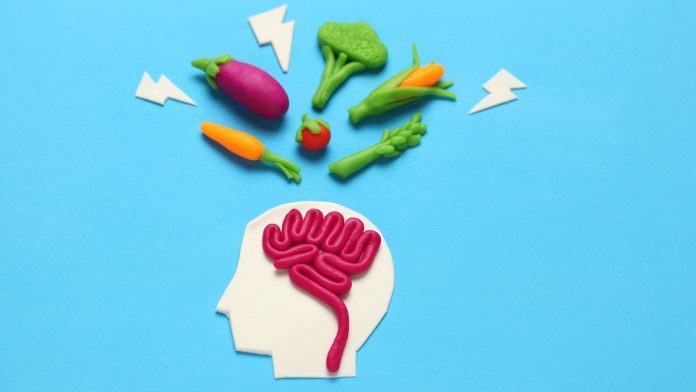
Our diet can have a huge impact on our mental wellbeing, but what potential does nutritional therapy hold for the treatment of mental health conditions? We put the question to Professor of Clinical Psychology, Julia Rucklidge.
Food is intrinsically linked to our emotional state; if we are stressed, we may seek food as a comfort or use it as a conduit to mindfulness or social interaction. And while many of us consider a healthy diet integral to our physical wellbeing, our understanding of the extent to which food can affect our mental health is still very much in its infancy.
Despite vast improvements in approaches to mental health care and support, conventional medicine is still accustomed to a treatment model whereby medication is often the first port of call for many mental health conditions. However, an increasing body of research is unearthing the extensive benefits that nutritional interventions can have in treating symptoms of mental illness, in some cases independent of medication.
A pioneer in this emerging field of study is Julia Rucklidge, a professor in clinical psychology at the University of Canterbury, New Zealand and co-author of The Better Brain which looks at the role of food and nutrients as a treatment for conditions including anxiety, depression, and ADHD. Given the increasing number of people presenting with mental health conditions and the economic burden this presents for healthcare systems, we spoke to Professor Rucklidge about her research on the role of nutrients in the expression of mental illness, the challenges around nutritional therapy as an approach to care and the benefits of holistic wellbeing in safeguarding mental and physical health.
What initially sparked your interest in the connection between nutrition and mental health?
When training to become a clinical psychologist, it was implied that nutrition was almost irrelevant to the brain. It is not really considered when dealing with patients with severe mental health conditions, and I suspect this is the same for many healthcare professionals working in other areas of care.
The impact of nutrition on mental health was first brought to my attention after my PhD supervisor was approached by some families from Southern Alberta, Canada, who were using nutrients to treat serious psychiatric problems, like bipolar disorder and psychosis. At first, she was incredibly sceptical because she knew how difficult diet manipulation studies were; however, she was presented with some strong data and subsequently undertook some small clinical trials. The published studies demonstrated an improvement in people’s mental wellbeing through using nutrients, and patients were less reliant on medication as a result. This was exciting, but because of external constraints and, I imagine, big pharma pressures, she was unable to continue with her work.
Then, after completing a PhD and post-doc, I moved to New Zealand for a job in 2000 and a few years later I ended up attending a public talk held by my PhD supervisor. By then, that naivety that you can treat everyone with drugs and psychotherapy had long gone and I recognised, based on clinical experience, and my own research, that people who were taking medications were not doing as well as we had hoped and that is the stark, sad reality. Of course, medications do have a place, but there are a significant number of people who are simply not going into remission with their psychiatric symptoms.
I know of countless people who are on antidepressants and are still depressed, and you have to stop and say that is not good enough. If you are depressed, the expectation should be that you take antidepressants to improve your health and no longer feel depressed. The problem is we have become so accustomed to people continuing to struggle with their mental health problems, despite receiving the best conventional care. Conversely, if you went to your GP to ask for treatment for an infection and you are given an antibiotic, but continue to have an infection, you would be a bit grumpy about that. People on antidepressants do return to their GP over and over again, doses get increased, and medication is changed but we do not seem to have the same expectations of clinical response as we see with physical ailments.
Recognising that not enough people were getting well, and after hearing of the data from my PhD supervisor, I decided to see if giving people nutrients in a pill form could help. I ran some really small clinical trials that started in 2007, there were lots of barriers and red tape, and mockery but I was persistent, I thought if we find that nutrients can help then we should be talking about this. Equally, if nothing came of the trial, we could stop peddling nutritional therapy as an option for serious mental health conditions.
We observed some stunning changes in people, not everyone, but enough people improved, so much so that if this was a drug, it would likely already be on the market.
Can you tell me about the connection between our mental health and the gut?
From the perspective of what I am doing, when you eat food, it goes to your intestines and travels through your colon before leaving the body. During that process, the microbes that are in your gut digest that food and break it down into usable forms which pass through the gut lining, while preventing any bad toxins from being absorbed. We know that there is a connection between our gut and the brain, and we are learning that there are several ways that the gut can communicate with the brain. One of them is through the nervous system (vagus nerve), another is through the immune system and then finally the endocrine system, or the Hypothalamic-Pituitary-Adrenal (HPA) axis.
There are three different routes in which the microbes, products and by-products can influence brain activity, we call this the bi-directional approach. What we have discovered in our research is that increasing the intake of vitamins and minerals affects brain activity. We are still in the early days of figuring out how this works but one of them may be through the microbiome. If you eat a variety of whole foods that will increase the diversity of your gut microbiome, which has a positive effect on your health.
Internationally, there has been a search for genes that affect mental health but the findings have been pretty limited. No one gene can be implicated in the development of mental illness. Instead, the research suggests that it is probably small effects of multiple different genes which can, for example, affect enzyme activity.
Studies are looking at specific bacteria as an indicator of depression or other mental health conditions. I have spoken with people who are at the forefront of this research, and they recognise that there is probably not one special bacteria, but with research, you have to start somewhere. That is why we also end up with these other treatments, like probiotics; it is difficult to hone in on particular bacterial strains that we should give to people, and how much.
In the scheme of minerals and vitamins, it does challenge this magic bullet approach, where you take one nutrient like vitamin D, and we hope that this can cure everything. The reason why we have seen such robust and fairly substantial effects is that we are combining the full array of essential micronutrients.

We have become so accustomed to people continuing to struggle with their mental health problems, despite receiving the best conventional care
How accountable is nutrition in treating mental health conditions and are there certain dietary patterns we should follow?
It is hard to do the type of research that validates nutritional intervention but the control trials that have been done over the last four years, which include randomised control trials, specifically targeting depression through diet manipulation have been positive. Those who were assigned to the diet change group showed greater improvement in their depression compared to those who were in the control group. It is encouraging that by changing your food environment you can have a positive effect on your mental health conditions.
Changing diet at the individual level is much simpler than trying to change eating habits at the population level. There is not a single study showing that the Western diet – which incorporates ultra-processed foods – is good for us, and intuitively we all know this. There are very few people who can get away with eating the Western diet and feel fine, many of us are going to be affected over the long term.
The food industry is powerful. We are seeing an influx of vegan, plant-based products and what are seen as planet-friendly foods, but these can be ultra-processed. Of course, it is important to incorporate more plants in your diet but for some people, a certain amount of good-quality meat is necessary for their mental wellbeing. I suspect we may end up creating a whole bunch of new chronic health problems if we eliminate meat completely from our diet, so we need to be mindful of that balance. There are ways that meat can be grown ethically, grass-fed, and the animals well-treated, we can address those ethical challenges. We can also think about regenerative agriculture and food growth from that perspective. We need to be truthful about the big picture.
Our diet should not be all-or-nothing; we need to be careful about some of the decisions that we are making right now around our food production and make sure that they are going to ultimately provide the nutrients that our brains and bodies need.
When following a plant-based or vegan diet it can be a lot harder to get certain nutrients such as B12, iron and essential fatty acids (DHA and EPA) in a bioavailable form. We know that EPA and DHA are the omega-three fatty acids that are most helpful in alleviating depression. Those eliminating animal products from their diet may be getting a lot of alpha-linolenic acids (ALA) but it is difficult to consume sufficient amounts of EPA and DHA because we do not easily convert ALA to DHA or EPA.
I do want to emphasise that there are healthy vegans and vegetarians out there who feel great and that is fantastic. I am not here to dispute that; I am just worried that the messaging around solely eating plant-based foods and eliminating some of these essential nutrients could be devastating for some people. There can be repercussions to eliminating certain foods and nutrients, we just need to be careful of not meat shaming people and come up with a more nuanced and balanced approach to this, rather than our diets being this all-or-nothing approach.

There is a place for professional mental health support, but there are so many easily accessible, evidence-based resources that can be useful to us
In our increasingly fast-paced and technological world where many people are spending less time preparing meals or watching devices while eating, to what extent are these behavioural factors contributing to the mental health crisis we are seeing today?
They have a big impact. There is research that has tried to parse the various impacts of food as a tool for social networking for instance, or the benefits of slowing down and preparing a meal. That, in itself, is very important for our mental health. When you start eating more real, whole foods, and you are cooking from scratch, that is going to be positive for your mental health.
There are many other things that we can all be doing to improve our wellbeing. Growing food, even if it is simply growing some herbs on your windowsill, exercising and being mindful are all beneficial to our mental health. A lot of research has been done on mindfulness and meditation, and forest bathing (Shinrin-yoku) for example. Cold showers may also have the potential for being good for our wellbeing. There are lots of different things we can do, it is not just one single behavioural change.
One of the messages that I would like to get out there is that we can empower people to change their health. There is a place for professional mental health support, but there are so many easily accessible, evidence-based resources that can be useful to us.
How would you like to see awareness and research around the link between nutrition and mental wellbeing develop?
We need young minds who are keen to conduct this research and we also need funding. I am overwhelmed by requests from graduate students but cannot support everyone on my own.
There is sufficient research available now to say we should be making a change to our food environment. I do not think we need more randomised controlled trials to prove there is a mismatch between what our brains need and what many of us eat. There will likely be criticisms about the size of the studies and that we have not covered a specific mental health condition, but I think we have enough robust research – population studies, correlational studies, longitudinal studies, randomised controlled trials – on diet and broad-spectrum micronutrients to validate a change in our food environment. While we could do more, larger trials I have yet to see a randomised control trial that shows us that the Western diet has been beneficial to our health.
We could roll out studies in school settings, for example, or look at ways of encouraging people to change their diet. Similarly, we could also look at the impact of vegan and vegetarian diets on mental health, the latest meta-analysis I saw was that a little bit of meat seems to be better for your mental health but those are association studies for the most part. We could also hone in on the microbiome; there are lots of opportunities for research into faecal microbiota transplants, which is a very new idea concept but is gaining interest.
There is a level of resistance and a reliance on the pharmaceutical model as the cure. I do not think we should remain fully dependent on the pharmaceutical model because it has just not worked for enough people long-term, otherwise, levels of mental illness should be going down.
Julia Rucklidge, PhD
Professor of Clinical Psychology
University of Canterbury
www.canterbury.ac.nz/science/contact-us/people/julia-rucklidge.html
https://twitter.com/JuliaRucklidge
This article is from issue 22 of Health Europa Quarterly. Click here to get your free subscription today.









